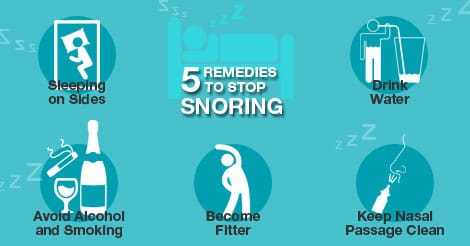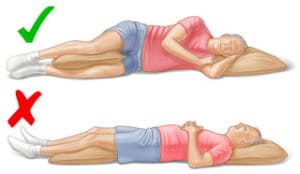How to Stop Snoring
Snoring is a common condition that can affect anyone occasionally, but if it happens frequently, it is not only disturbing your family members but can lead to quality of your sleep. Poor quality of sleep causes irritability.
It can even be a hurdle in your relationship. You don’t need to feel embarrassed, if you are a habitual snorer, there are many solutions to it.
There are many health risks associated with snoring too. It causes frequent waking from the sleep. It interrupts breathing. It can cause high blood pressure and lead to a risk of heart attack and stroke. Poor night’s sleep also makes you drowsy during day time. Gastroesophageal reflux disease, or GERD, is very common in people with sleep apnea. It also leads to overweight.
Snoring occurs when air flow passing through nose and mouth is obstructed during sleep. It causes surrounding tissues to vibrate and sound is produced. There are various reasons for the air flow to get obstructed:
- When people suffer from the sinus infection or allergy, air passage constructs.
- Deformities of the nose such as a deviated septum or nasal polyps can also obstruct air flow.
- Throat and tongue muscles get relaxed too much that causes them to collapse and fall back into the airway. Poor muscle tone in the throat can be due to alcohol consumption or use of sleeping pills. Aging also causes relaxation of throat and tongue muscles.
- Overweight can also lead to bulky throat tissue.
- A long soft palate or a long uvula narrows down the opening from the nose to the throat. When these vibrate and bump against one another, the airway gets obstructed that leads to snoring.
How You Sleep Also Reveals A Lot about The Cause of Sleeping.
- Closed-mouth snoring indicates that you might have a problem with your tongue.
- Open-mouth snoring indicates problems related to the tissues in the throat.
- If snoring occurs when you are sleeping on your back, mostly it is a mild snoring and changing sleep habits can probably help cure it.
- If snoring happens in all sleeping positions, it indicates a severe problem and you need to go through diagnosis and treatment.
Remedies to Stop Snoring

There are many anti-snoring devices and treatment available for the problem of snoring. Identifying a cause for snoring can help you find a cure for it.
Life Style Changes:
Reduce Weight: If you are obese, it is advisable that you shed some weight. It will reduce fatty tissue in your throat and help you decrease snoring or even stop it.
Exercise: Exercise tones muscles in your throat and thus helps decrease snoring. There is a specific exercise to strengthen your throat muscles.
Quit Smoking: Smoking irritates membranes in the throat and nose and causes snoring. Quitting smoking will help you stop it.
Avoid alcohol, sedatives: Alcohol or any sedatives also relaxes muscles in throat leading to snoring. You can seek medical help to get rid of it.
Follow regular sleep patterns: You develop healthy sleep pattern and timing. It helps you with good quality of sleep.
Bed Time Remedies:
Clear nasal passages: If you have a stuffy nose, try to make it clear before you go to bed. You can use a Neti pot, nasal decongestant spray or nasal strips to help you breathe more easily while sleeping. If you have allergies, stay away from allergic conditions. Your bedroom must be free from dust. You should not allow pets to your bedrooms.
Keep bedroom air moist: Dry air can irritate membranes in the nose and throat, so if swollen nasal tissues are the problem, a humidifier may help.
Change your sleeping position: Specially designed pillows are available in the market that ensures that your neck muscles are not crimped. Elevating your head four inches also ease breathing.

Sleep on your side instead of your back: You should develop a habit of sleeping on your side instead of sleeping on your back.
Try an anti-snoring mouth appliance: You can use an anti-snoring device that helps open your airway during sleep.
Medical Cure:
If snoring doesn’t stop through general remedies, you should consult your physician or ENT doctor; you might be recommended a medical device or surgical procedure such as
Laser-assisted uvulopalatoplasty (LAUP): In this process, the uvula is shortened through laser and a small cut is made in the soft palate on either side. As the cuts get healed, the surrounding tissues get stiffened that prevents the vibrations that cause snoring.
Somnoplasty: In this procedure, tissues of the uvula and soft palate are removed with the help of low levels of radiofrequency heat. It takes about 30 minutes to do the surgery and the procedure is performed under local anaesthesia.
Palatal implants: A small plastic implants is inserted into the soft palate. It prevents the collapse of the soft palate and thus helps prevent snoring.
Traditional surgery: Size of your airway is reduced by removing tissues or correcting abnormalities through traditional surgery such as Uvulopalatopharyngoplasty (UPPP), Thermal Ablation Palatoplasty (TAP), tonsillectomy or adenoidectomy.
Continuous Positive Airway Pressure (CPAP): It is a machine that you need to keep at your bedside and you wear over your nose or face, it blows pressurized air into a mask and keeps your airway open during sleep.
Most Searching Terms:
- How to Stop Snoring Permanently
- Sleep Snoring & Disorders
- Solution to Snoring Partner
